Lift Kit Laws by State: Rules and Guidelines for Lift Enthusiasts
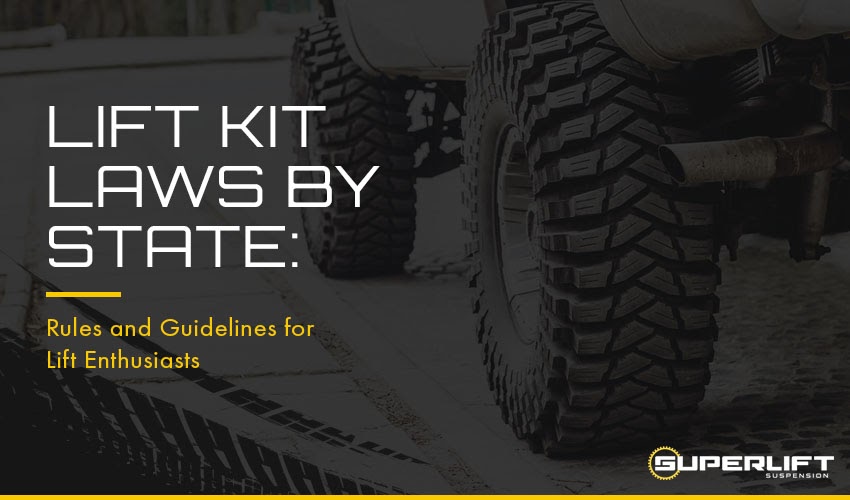

There’s nothing quite like hitting the open road in a lifted truck, but not if you’re worried about getting stopped by the cops. Every state has its own lifted truck laws, and no two states are exactly alike. Even if you plan on spending most of your time off-road, you need to comply with your state’s rules and guidelines for lifted trucks.
You may scoff at the idea of anyone telling you what you can and can’t do with your truck, but these laws put an emphasis on safety. They’re designed to keep you and the other drivers on the road out of harm’s way. Some regulations limit the height of lifted trucks, while others mandate specific safety requirements. It all depends on where you live.
As the owner of a lifted truck, it’s your responsibility to stay up to date with your area’s lifted truck laws. These laws are subject to change, so take a moment to contact your local branch of government for the latest information before you invest in truck lift kits. If you’re traveling across state lines, research your destination and all the states you plan on hitting along the way. Here’s our state-by-state breakdown of all the laws you need to know.
NOTE:
When referring to the frame height, most states measure from the center of your tail lights or headlights down to the pavement. Keep a tape measure handy to make sure your vehicle complies with the law.
Alabama
Alabama is fairly lax when it comes to suspension requirements. There are currently no laws that limit suspension lifts, frame height, or bumper height. Residents are free to install truck lift kits, aftermarket wheels, tires, shocks, and bumpers. However, your vehicle needs to be in good condition before you hit the road.
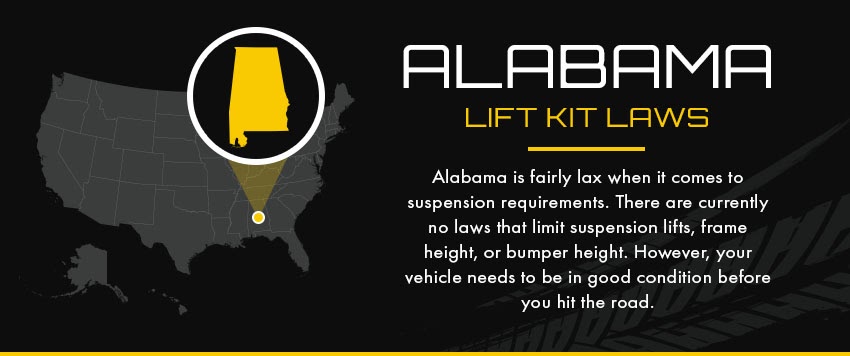
Alaska
There are no laws covering a vehicle’s suspension, but the vehicle body must be no higher than three inches above the top of the frame. All aftermarket parts are allowed as long as they are in good condition.
Arizona
Truck and Jeep lift kits are allowed as long as you use mud flaps and fenders. There are no frame height or suspension restrictions.
Arkansas
You can modify your lifted truck as you see fit in Arkansas. There are no suspension lift, frame height, or body lift laws in place, so enjoy the open road.
California
California has considerably more strict lift kit laws in place. Frame height and body lifts are limited to just five additional inches. Aftermarket parts are allowed.
Colorado
Colorado’s lift laws can throw some drivers for a loop. While the state says the manufacturer’s original design must not be altered, suspension lifts are allowed as long as they are of the same design as the factory suspension system.
Connecticut
Suspension lift kits can be no higher than four inches, and fenders are required for all four wheels, but, other than that, you’re free to modify your truck or Jeep as you see fit.
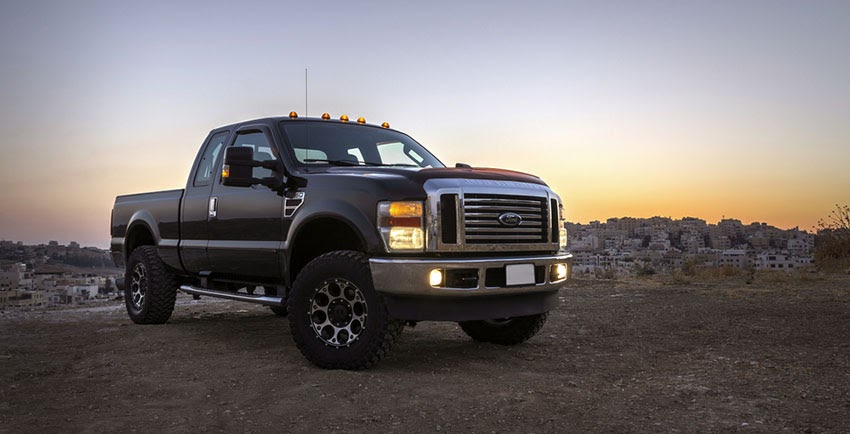
Delaware
Body lifts are limited to just three inches, while the bumper height can be no higher than a total of 30 inches. Your brakes must be capable of stopping the vehicle within 30 feet when traveling at speeds of 20 mph. A second mechanical parking brake is also required.
Florida
Max bumper height depends on the vehicle’s gross vehicle weight rating (GVWR). Vehicles under 2,000 GVWR have a max bumper height of 24 inches on the front and 26 inches on the rear. Vehicles with a GVWR of 2,000 to 2,999 have a max bumper height of 27 inches on the front and 29 inches on the rear. Vehicles with a GVWR of 3,000 to 3,999 have a max bumper height of 28 inches on the front and 30 inches on the rear. Vehicles with a GVWR over 5,000 are exempt.
Georgia
Suspension lifts are limited to just two inches, making Georgia less off-road friendly than one would hope, although you can still install aftermarket parts.
Hawaii
Body lifts are limited to just three inches; however, vehicles are limited by frame and bumper height. Vehicles under 4,500 GVWR have a max bumper and rear height of 29 inches. Vehicles with a GVWR of 4,501 to 7,500 have a max bumper and rear height of 33 inches. Vehicles with a GVWR of 7,501 to 10,000 have a max bumper and rear height of 35 inches. Vehicles with a GVWR over 10,000 are exempt.
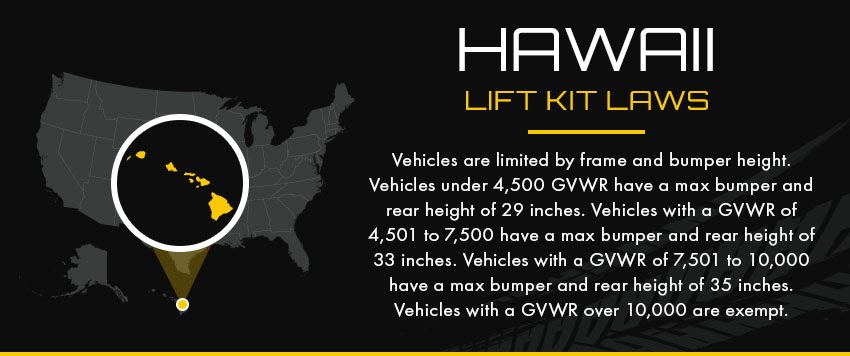
Idaho
With few off-road restrictions in place, Idaho is a great place to explore the open road. Bumper height is limited to a total of 30 inches for 4x4s with a GVWR under 10,000 lbs.
Illinois
Your vehicle’s bumper cannot be raised or lowered by more than three inches. Vehicles with a GVWR under 4,500 have a max frame height of 24 inches and a max bumper height of 24 inches in the front, and 26 inches in the rear. Vehicles with a GVWR from 4,501 to 7,500 have a max frame height of 26 inches and a max bumper height of 27 inches in the front, and 29 inches in the rear. Vehicles with a GVWR from 7,501 to 10,000 have a max frame height of 28 inches and a max bumper height of 28 inches in the front, and 30 inches in the rear.
Indiana
Bumpers must be no higher than a total of 30 inches, but the state has no suspension or frame height restrictions in place.
Iowa
The state has a pending law that would limit frame height to 23 inches and body lifts to five inches, but the state currently has no restrictions in place.
Kansas
There are no restrictions in place for body lifts or suspension systems.
Kentucky
There are no restrictions in place for body lifts or suspension systems.
Louisiana
There are no restrictions in place for body lifts or suspension systems.
Maine
The state has strict frame height limitations in place. Vehicles with a GVWR under 4,501 have a max frame height of 24 inches in the front, and 26 inches in the rear. Vehicles with a GVWR from 4,501 to 7,500 have a max frame height of 27 inches in the front, and 29 inches in the rear. Vehicles over 7,501 GRWR have a max frame height of 28 inches in the front, and 30 inches in rear.
Maryland
Bumper and frame height must not exceed 20 inches for cars and SUVs, with a 28-inch limit for trucks. Pickup trucks over 10,000 but not more than 18,000 lbs. are limited to 32 inches.
Massachusetts
Suspension lifts are limited to just two inches.
Michigan
Lift blocks are not allowed on front springs, and rear lift blocks must not exceed four inches. Additionally, vehicles under 4,501 GVWR have a max frame height of 24 inches and a max bumper height of 26 inches. Vehicles from 4,501 to 7,500 GVWR have a max frame height of 24 inches and a max bumper height of 28 inches. Vehicles over 7,501 GVWR have a max frame height of 26 inches and a max bumper height of 30 inches.
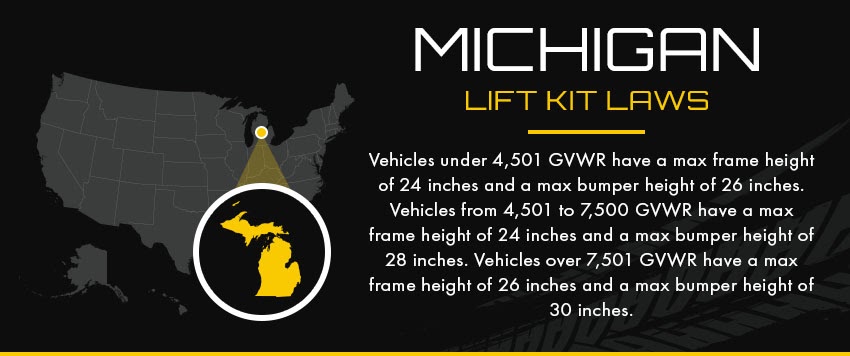
Minnesota
Bumper height must be within six inches of the factory suspension system. The max bumper height for 4x4s is 25 inches. Bumpers must be at least 4.5 inches tall and must extend 10 inches outside of the frame rail. Bumpers must be attached in at least four places.
Mississippi
There are no restrictions in place for body lifts or suspension systems.
Missouri
Bumpers must be at least 4.5 inches tall. Vehicles under 4,501 GVWR have a max bumper height of 24 inches in the front, and 26 inches in the back. Vehicles with a GVWR from 4,501 to 7,500 have a max bumper height of 27 inches in the front, and 29 inches in the back. Vehicles with a GVWR from 7,501 to 9,000 have a max bumper height of 28 inches in the front, and 30 inches in the back. Vehicles with a GVWR from 9,001 to 11,500 have a max bumper height of 29 inches in the front, and 31 inches in the back.
Montana
There are no restrictions in place for body lifts or suspension systems.
Nebraska
There are no restrictions in place for body lifts or suspension systems.
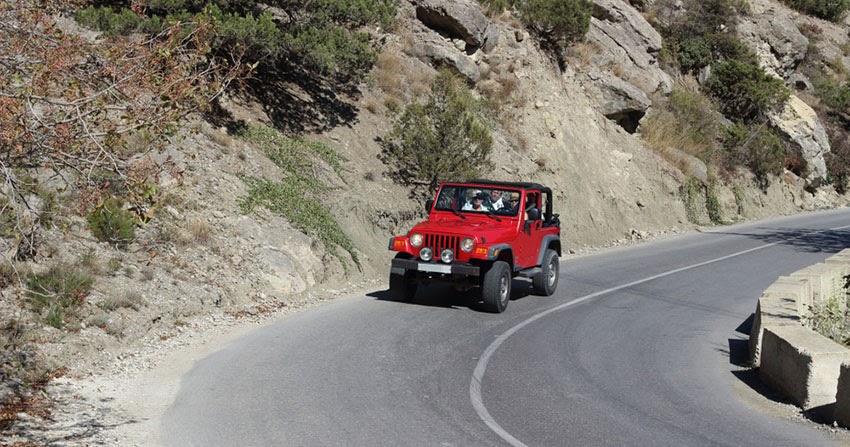
Nevada
Vehicles under 4,501 GVWR have a max body height of 28 inches. Vehicles with a GVWR of 4,501 to 7,500 have a max body height of 30 inches. Vehicles with a GVWR of 7,500 to 10,000 have a max body height of 32 inches.
New Hampshire
Bumper height is limited to a total of 30 inches.
New Jersey
As one of the strictest states in the country, New Jersey requires safety inspections for all lifted vehicles, with strict tire, wheel, brake, steering, bumper, and suspension requirements in place.
New Mexico
There are no restrictions in place for body lifts or suspension systems.
New York
While the state has few restrictions in place, all cars and SUVs must have front and rear bumpers. The max bumper height for trucks is 30 inches.
North Carolina
There are no restrictions in place for body lifts or suspension systems.
North Dakota
Suspension lifts are limited to four inches, with a maximum body height of 42 inches. Bumper height is limited to a total of 27 inches, and tires larger than 44 inches are not allowed.
Ohio
Cars and SUVs have a max bumper height of 22 inches in the front, and 22 inches in the rear. Vehicles under 4,501 GVWR have a max bumper height of 24 inches in the front, and 26 inches in the rear. Vehicles with a GVWR of 4,501 to 7,500 have a max bumper height of 27 inches in the front, and 29 inches in the rear. Vehicles with a GVWR of 7,500 to 10,000 have a max bumper height of 28 inches in the front, and 31 inches in the rear.
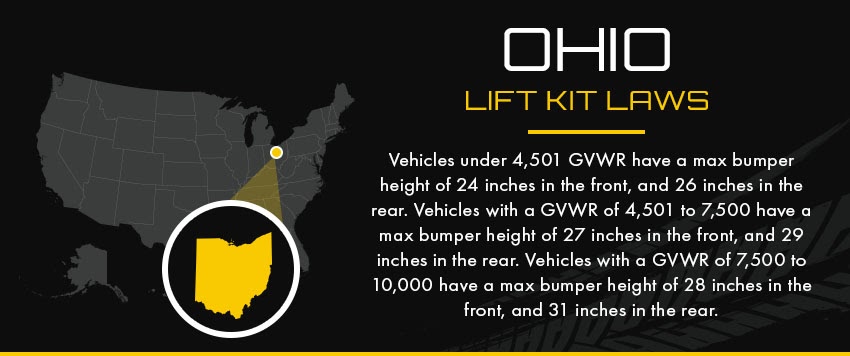
Oklahoma
There are no restrictions in place for body lifts or suspension systems.
Oregon
There are no restrictions in place for body lifts or suspension systems.
Pennsylvania
Front lift blocks are not allowed in the state, while rear lift blocks are limited to five inches. Cars and SUVs have a max bumper height of 22 inches in the front, and 22 inches in the rear. Vehicles under 5,001 GVWR have a max bumper height of 24 inches in the front, and 26 inches in the back. Vehicles with a GVWR from 5,001 to 7,000 have a max bumper height of 27 inches in the front, and 29 inches in the back. Vehicles with a GVWR from 7,001 to 9,000 have a max bumper height of 28 inches in the front, and 30 inches in the back. Vehicles with a GVWR from 9,001 to 11,000 have a max bumper height of 30 inches in the front, and 30 inches in the back.
Rhode Island
Suspension truck and Jeep lift kits are limited to just four inches.
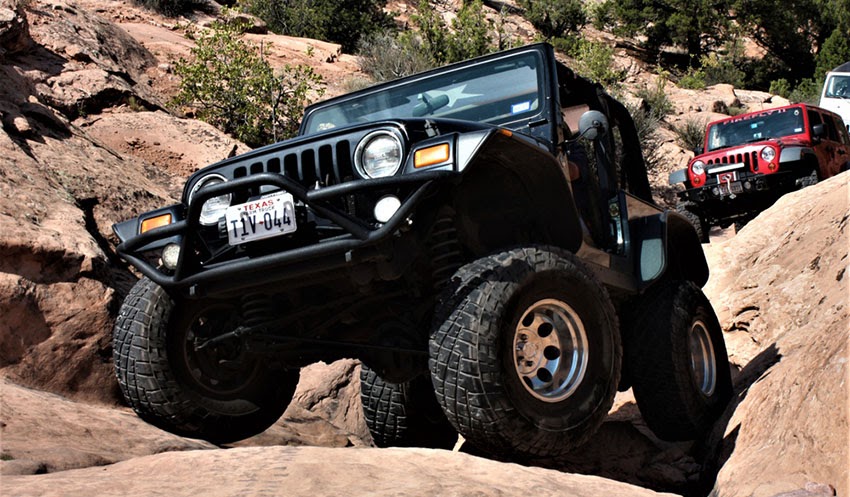
South Carolina
There are no restrictions in place for body lifts or suspension systems.
South Dakota
There are no restrictions in place for body lifts or suspension systems.
Tennessee
Front lift blocks are prohibited. Cars and SUVs have a max frame height of 22 inches. Vehicles under 4,501 GVWR have a max frame height of 24 inches. Vehicles between 4,501 and 7,500 GVWR have a max frame height of 26 inches. Vehicles from 7,501 to 10,000 GVWR have a max frame height of 28 inches.
Texas
There are no restrictions in place for body lifts or suspension systems.
Utah
Vehicles under 4,500 GVWR have a max frame height of 24 inches. Those with a GVWR between 4,500 and 7,499 have a max frame height of 26 inches, and those over 7,500 have a max frame height of 28 inches.
Vermont
There are no restrictions in place for body lifts or suspension systems.
Virginia
Front lift blocks are not allowed. Vehicles under 4,501 GVWR have a max bumper height of 28 inches in the front and rear. Vehicles between 4,501 and 7,500 have a max bumper height of 29 inches in the front and 30 inches in the back. Vehicles above 7,501 have a max bumper height of 30 inches in the front and 31 inches in the back.
Washington
Cars and SUVs have a max bumper height of 22 inches in the front and back. Vehicles under 4,501 GVWR have a max bumper height of 24 inches in the front, and 26 inches in the rear. Vehicles between 4,501 and 7,500 GVWR have a max bumper height of 27 inches in the front, and 29 inches in the rear. Vehicles with GVWR of 7,501 and over have a max bumper height of 28 inches in the front, and 30 inches in the rear.
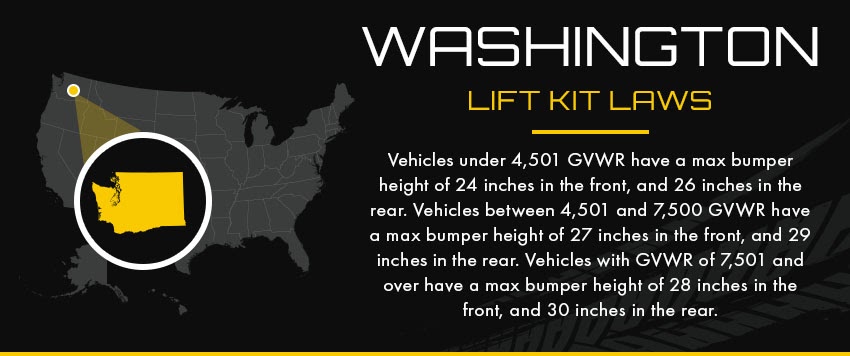
West Virginia
Bumper height is limited to 31 inches and body lifts are limited to just three inches.
Wisconsin
All pickup trucks must have rear bumpers. Car bumpers must be within two inches of factory bumper height.
Wyoming
There are no restrictions in place for body lifts or suspension systems.
Look for the States Where You’ll Be Driving
As you can see, lift kit laws vary dramatically by state. Keep this information in mind when shopping for truck and Jeep lift kits.